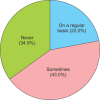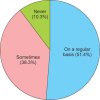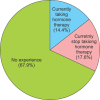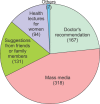Awareness and experience of menopausal symptom and hormone therapy in korean postmenopausal women
- PMID: 25371886
- PMCID: PMC4217564
- DOI: 10.6118/jmm.2014.20.1.7
Awareness and experience of menopausal symptom and hormone therapy in korean postmenopausal women
Abstract
Objectives: To investigate awareness and experience of menopausal symptom and hormone therapy in Korean postmenopausal women.
Methods: A total of 570 postmenopausal women were accepted our survey. The women filled out the questionnaires composed of medical and surgical history, menopausal age and symptom, demand of treatment on menopausal symptom, and personal method for overcoming the symptom. Also, we make inquiries about experience of hormone therapy, concern about hormone therapy, improvement of menopausal symptom after therapy, adverse effect, and cause of cease the therapy.
Results: According to the survey, 80% (456/570) of the women experienced menopausal symptom. When they felt the symptom at first, 47% (213/570) of women was 46-50 years old. The most common menopausal symptom was hot flushes (141/570). A number of Korean women regarded that menopause was a natural process of ageing (69%). Eighty two % of women thought to need to have treatment on menopausal symptom. However, only half (43%) visited doctor. The most concerned disease after menopause they had answered was osteoporosis (60%) but only 22% of women were taken regular check-up of bone mineral density. The common causes were unwilling to do treatment were concern about adverse effect (51%) and indefinite fear of cancer (32%). Moreover, many women got diverse information about menopause from the mass media than professional advice.
Conclusion: Only a minority of Korean postmenopausal women with menopausal symptoms had taken a hormone therapy. We should provide appropriate education and counsel to Korean peri-menopause women.
Keywords: Awareness; Experience; Hormone therapy; Korean postmenopausal women; Menopausal symptom.
Figures







References
-
- Choi H, Lee HK, Park HM. The Korean menopausal women`s attitudes and awareness on menopause: results of Korean gallup epidemiologic survey on menopause and HRT. J Korean Soc Menopause. 2003;9:36–43.
-
- Deeks A, Zoungas S, Teede H. Risk perception in women: a focus on menopause. Menopause. 2008;15:304–309. - PubMed
-
- Rossouw JE, Anderson GL, Prentice RL, LaCroix AZ, Kooperberg C, Stefanick ML, et al. Risks and benefits of estrogen plus progestin in healthy postmenopausal women: principal results From the Women's Health Initiative randomized controlled trial. JAMA. 2002;288:321–333. - PubMed
-
- Chung YJ, Kim MR, Jeong HW, Yoon BK, Lee BS, Kang BM, et al. Changing Korean Menopausal Women's Awareness on Hormone Therapy: 7-years after Women's Health Initiative Study. J Korean Soc Menopause. 2012;18:94–99.
-
- North American Menopause Society. Estrogen and progestogen use in postmenopausal women: 2010 position statement of The North American Menopause Society. Menopause. 2010;17:242–255. - PubMed
LinkOut - more resources
Full Text Sources
Other Literature Sources

